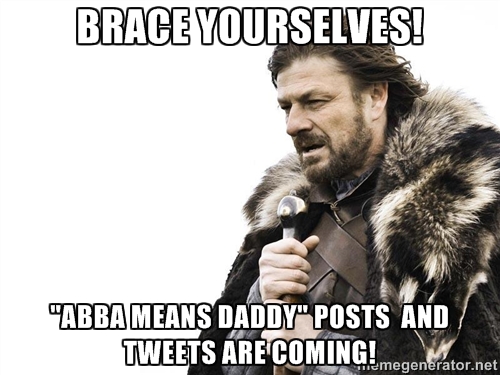So, repeat after me, “‘Abba’ does NOT mean ‘daddy.'”
One more time: “‘Abba’ does NOT mean ‘daddy.'”
Are we understood? Good.
Yet another year goes by and yet another year this persistent bit of fiction needs to be rebuffed. It is the bane of Aramaicists worldwide: The idea that “Abba” — in Jesus’ native language of Aramaic — is baby-speak, child babble, an informal appellation to call one’s father by. An intimate term that was reserved for a close relationship. It’s silly. It’s rubbish…
However, it is not that simplistic.
אבא “abba” was a term that meant “father.” When used in direct address it did mean “my father.” However, this word was used by children and adults in both formal and informal contexts. You have full grown men referring to their fathers as “abba” and some Rabbis even referring to honored elder members of their schools as “abba” (it’s were we get the word “Abbot” in Christian tradition, even).
However, what makes this very confusing, especially in modern times, is that “abba” was adopted into Modern Hebrew as… you guessed it… “daddy.” This was simply not the case in Jesus’ day. It’s a modern development.
So off you go, with newfound knowledge in hand! Preach against the pulpit fiction. Perhaps the linguists’ headaches will subside… Perhaps…
You can read about its origins here.
And see another fun infographic about it to share here.
In spite of rogue etymology, have a wonderful Father’s Day!
If you’d like to learn more about Jesus’ language, click here.
Peace,
-Steve

